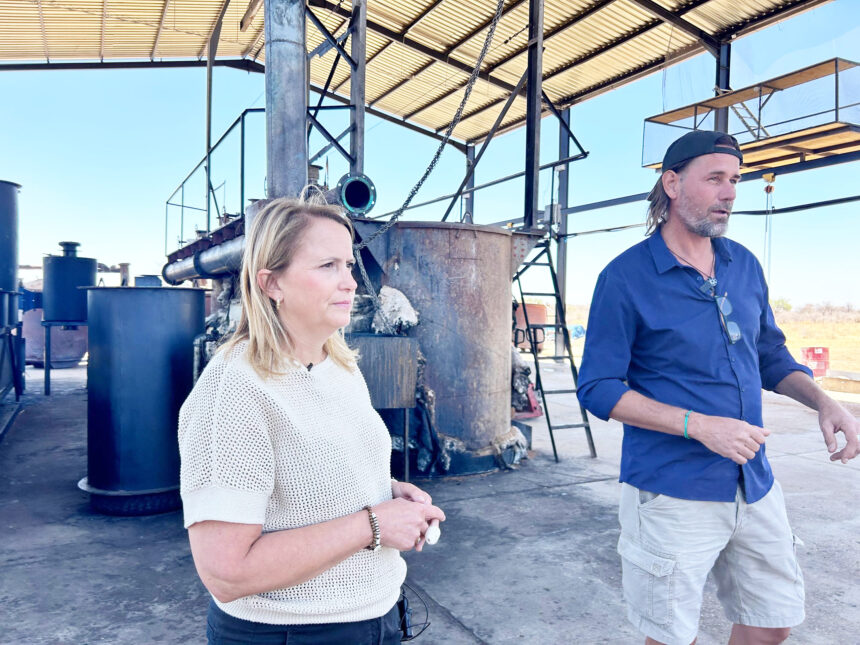OTJIWARONGO – PyroNam, a subsidiary of the German company PyroCCS GmbH, is on a mission to establish 50 biochar plants in Namibia by 2030. If successful, this would significantly contribute to carbon capture and improving soil health.
Biochar, a stable form of charcoal produced from biomass, offers long-term carbon storage and enhances agricultural productivity by improving soil quality.
The company has already invested N$14 million into its operations, with plans for further expansion. PyroNam aims to scale its production capacity by leveraging problematic encroaching acacia species as biomass, sourced from local farmers under contracts that provide them with a stable revenue stream.
Each biochar plant is projected to cost about N$6 million, and PyroNam is actively seeking project debt financing to support this ambitious plan.
Henrike Geldmacher, managing director of PyroNam, emphasised the dual benefits of the initiative: “Our work not only mitigates climate change but also enhances agricultural resilience and food security.” The pilot project at Farm Waltershagen has already demonstrated the potential for significant CO2 sequestration of approximately 2 200 tonnes of CO2 equivalent annually from an input capacity of 3 500 tonnes of dried biomass.
This information was shared on Monday during a media tour organised by the Namibia Investment Promotion and Development Board (NIPDB) that took six journalists to visit the Waltershagen farm in the Otjiwarongo area, where PyroNam is operating its biochar production activities. This project is one of the projects in the country facilitated by NIPDB.
PyroNam’s proprietary technology is designed for decentralised use in rural areas, making it robust and cost-effective.
The company has successfully obtained European Biochar Certification (EBC), which allows it to generate carbon credits for the voluntary market. These credits can be sold at prices exceeding US$150 each, providing a financial incentive for carbon emitters to invest in biochar production as a means of offsetting emissions.
Geldmacher added that the company already managed to sell their carbon credits to a European company.
Despite the promising outlook, challenges remain. Eck Volkmann, the biochar manager at PyroNam, noted that funding for these plants is not easily accessible. He suggested that oil and gas companies could play a crucial role in financing these initiatives while holding equity stakes in the plants.
The establishment of biochar plants is expected to create direct employment opportunities. Currently, the Otjiwarongo plant employs 50 individuals directly and through biomass suppliers. As more plants are built, this number could increase significantly, contributing to local economic growth.
“With our expansion plans, we anticipate substantial job creation and economic benefits,” Geldmacher stated.
Furthermore, the initiative aims to improve land management practices in Namibia by addressing issues related to bush encroachment an ecological problem that threatens grazing lands and biodiversity. By converting encroaching bush into biochar, PyroNam not only enhances soil fertility but also helps restore degraded landscapes.
Looking ahead, PyroNam plans to build additional pilot plants by 2025 while developing a business model suitable for communal farmland. The company is also collaborating with national research institutions to promote biochar use among farmers through trials and market development initiatives.
As Namibia strives to become a leader in carbon-negative practices, PyroNam’s efforts could position the country as a model for sustainable agricultural practices and climate change mitigation strategies globally.
Geldmacher further commended the NIPDB for its significant role in facilitating the establishment of the project.
“The NIPDB has made it easier for us to navigate the business landscape in Namibia,” she stated, highlighting invaluable support in obtaining necessary permits and certifications.
She emphasised that the assistance provided by NIPDB has been crucial for establishing efficient operations. “From acquiring working visas to ensuring compliance with local regulations, their guidance has been invaluable,” she added. -mndjavera@nepc.com.na


